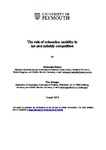The role of relocation mobility in tax and subsidy competition
| dc.contributor.author | Haupt, Alexander | |
| dc.contributor.author | Krieger, T | |
| dc.date.accessioned | 2019-11-23T01:15:50Z | |
| dc.date.issued | 2020-03 | |
| dc.identifier.issn | 0094-1190 | |
| dc.identifier.issn | 1095-9068 | |
| dc.identifier.other | 103196 | |
| dc.identifier.uri | http://hdl.handle.net/10026.1/15176 | |
| dc.description.abstract |
In this paper, we analyse the role of relocation mobility in tax and subsidy competition. Our primary result is that increasing mobility of firms leads to increasing ‘net’ tax revenues under plausible assumptions. While enhanced relocation mobility intensifies tax competition, it weakens subsidy competition. The resulting fall in government subsidy payments can overcompensate the decline in tax revenues, leading to a rise in net tax revenues. Interestingly, the opportunity costs of subsidy competition can rise along with net tax revenues. We derive these conclusions in a model in which two governments are first engaged in subsidy competition and thereafter in tax competition, and firms locate and potentially relocate in response to successive policy choices on taxes and subsidies. | |
| dc.format.extent | 0-0 | |
| dc.language | en | |
| dc.language.iso | en | |
| dc.publisher | Elsevier BV | |
| dc.subject | Tax competition | |
| dc.subject | Subsidy competition | |
| dc.subject | Capital and firm mobility | |
| dc.subject | Foreign direct investment | |
| dc.title | The role of relocation mobility in tax and subsidy competition | |
| dc.type | journal-article | |
| dc.type | Journal Article | |
| plymouth.author-url | https://www.webofscience.com/api/gateway?GWVersion=2&SrcApp=PARTNER_APP&SrcAuth=LinksAMR&KeyUT=WOS:000522142300001&DestLinkType=FullRecord&DestApp=ALL_WOS&UsrCustomerID=11bb513d99f797142bcfeffcc58ea008 | |
| plymouth.volume | 116 | |
| plymouth.publication-status | Published | |
| plymouth.journal | Journal of Urban Economics | |
| dc.identifier.doi | 10.1016/j.jue.2019.103196 | |
| plymouth.organisational-group | /Plymouth | |
| plymouth.organisational-group | /Plymouth/Admin Group - REF | |
| plymouth.organisational-group | /Plymouth/Admin Group - REF/REF Admin Group - FoAH | |
| plymouth.organisational-group | /Plymouth/Faculty of Arts, Humanities and Business | |
| plymouth.organisational-group | /Plymouth/Faculty of Arts, Humanities and Business/Plymouth Business School | |
| plymouth.organisational-group | /Plymouth/REF 2021 Researchers by UoA | |
| plymouth.organisational-group | /Plymouth/REF 2021 Researchers by UoA/UoA17 Business and Management Studies | |
| plymouth.organisational-group | /Plymouth/Users by role | |
| plymouth.organisational-group | /Plymouth/Users by role/Academics | |
| dcterms.dateAccepted | 2019-09-26 | |
| dc.rights.embargodate | 2021-10-15 | |
| dc.identifier.eissn | 1095-9068 | |
| dc.rights.embargoperiod | Not known | |
| rioxxterms.versionofrecord | 10.1016/j.jue.2019.103196 | |
| rioxxterms.licenseref.uri | http://www.rioxx.net/licenses/all-rights-reserved | |
| rioxxterms.licenseref.startdate | 2020-03 | |
| rioxxterms.type | Journal Article/Review |


